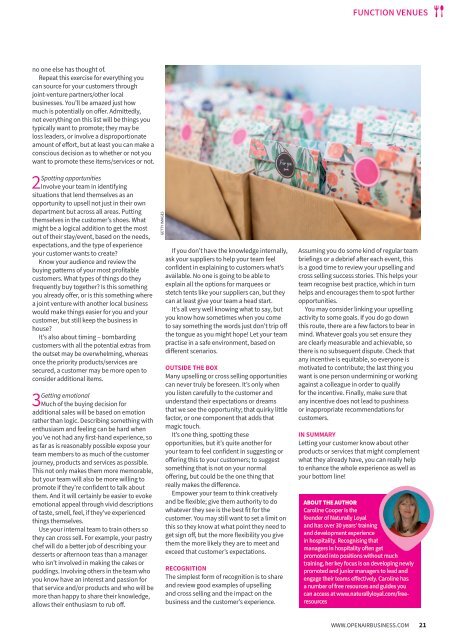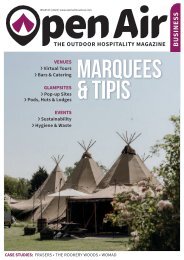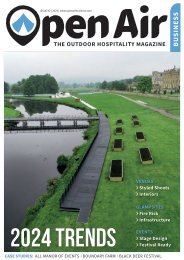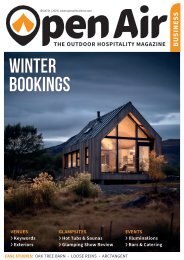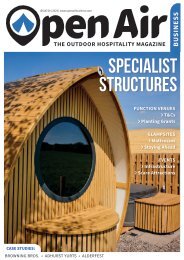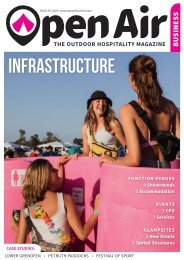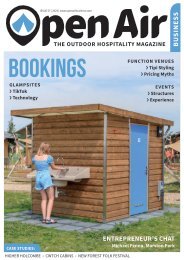July 2021
The UK's outdoor hospitality business magazine for function venues, glamping, festivals and outdoor events
The UK's outdoor hospitality business magazine for function venues, glamping, festivals and outdoor events
Create successful ePaper yourself
Turn your PDF publications into a flip-book with our unique Google optimized e-Paper software.
FUNCTION VENUES<br />
no one else has thought of.<br />
Repeat this exercise for everything you<br />
can source for your customers through<br />
joint-venture partners/other local<br />
businesses. You’ll be amazed just how<br />
much is potentially on offer. Admittedly,<br />
not everything on this list will be things you<br />
typically want to promote; they may be<br />
loss leaders, or involve a disproportionate<br />
amount of effort, but at least you can make a<br />
conscious decision as to whether or not you<br />
want to promote these items/services or not.<br />
Spotting opportunities<br />
2 Involve your team in identifying<br />
situations that lend themselves as an<br />
opportunity to upsell not just in their own<br />
department but across all areas. Putting<br />
themselves in the customer’s shoes. What<br />
might be a logical addition to get the most<br />
out of their stay/event, based on the needs,<br />
expectations, and the type of experience<br />
your customer wants to create?<br />
Know your audience and review the<br />
buying patterns of your most profitable<br />
customers. What types of things do they<br />
frequently buy together? Is this something<br />
you already offer, or is this something where<br />
a joint venture with another local business<br />
would make things easier for you and your<br />
customer, but still keep the business in<br />
house?<br />
It's also about timing – bombarding<br />
customers with all the potential extras from<br />
the outset may be overwhelming, whereas<br />
once the priority products/services are<br />
secured, a customer may be more open to<br />
consider additional items.<br />
Getting emotional<br />
3 Much of the buying decision for<br />
additional sales will be based on emotion<br />
rather than logic. Describing something with<br />
enthusiasm and feeling can be hard when<br />
you’ve not had any first-hand experience, so<br />
as far as is reasonably possible expose your<br />
team members to as much of the customer<br />
journey, products and services as possible.<br />
This not only makes them more memorable,<br />
but your team will also be more willing to<br />
promote if they’re confident to talk about<br />
them. And it will certainly be easier to evoke<br />
emotional appeal through vivid descriptions<br />
of taste, smell, feel, if they've experienced<br />
things themselves.<br />
Use your internal team to train others so<br />
they can cross sell. For example, your pastry<br />
chef will do a better job of describing your<br />
desserts or afternoon teas than a manager<br />
who isn’t involved in making the cakes or<br />
puddings. Involving others in the team who<br />
you know have an interest and passion for<br />
that service and/or products and who will be<br />
more than happy to share their knowledge,<br />
allows their enthusiasm to rub off.<br />
GETTY IMAGES<br />
If you don’t have the knowledge internally,<br />
ask your suppliers to help your team feel<br />
confident in explaining to customers what’s<br />
available. No one is going to be able to<br />
explain all the options for marquees or<br />
stetch tents like your suppliers can, but they<br />
can at least give your team a head start.<br />
It’s all very well knowing what to say, but<br />
you know how sometimes when you come<br />
to say something the words just don’t trip off<br />
the tongue as you might hope! Let your team<br />
practise in a safe environment, based on<br />
different scenarios.<br />
OUTSIDE THE BOX<br />
Many upselling or cross selling opportunities<br />
can never truly be foreseen. It’s only when<br />
you listen carefully to the customer and<br />
understand their expectations or dreams<br />
that we see the opportunity; that quirky little<br />
factor, or one component that adds that<br />
magic touch.<br />
It’s one thing, spotting these<br />
opportunities, but it’s quite another for<br />
your team to feel confident in suggesting or<br />
offering this to your customers; to suggest<br />
something that is not on your normal<br />
offering, but could be the one thing that<br />
really makes the difference.<br />
Empower your team to think creatively<br />
and be flexible; give them authority to do<br />
whatever they see is the best fit for the<br />
customer. You may still want to set a limit on<br />
this so they know at what point they need to<br />
get sign off, but the more flexibility you give<br />
them the more likely they are to meet and<br />
exceed that customer’s expectations.<br />
RECOGNITION<br />
The simplest form of recognition is to share<br />
and review good examples of upselling<br />
and cross selling and the impact on the<br />
business and the customer’s experience.<br />
Assuming you do some kind of regular team<br />
briefings or a debrief after each event, this<br />
is a good time to review your upselling and<br />
cross selling success stories. This helps your<br />
team recognise best practice, which in turn<br />
helps and encourages them to spot further<br />
opportunities.<br />
You may consider linking your upselling<br />
activity to some goals. If you do go down<br />
this route, there are a few factors to bear in<br />
mind. Whatever goals you set ensure they<br />
are clearly measurable and achievable, so<br />
there is no subsequent dispute. Check that<br />
any incentive is equitable, so everyone is<br />
motivated to contribute; the last thing you<br />
want is one person undermining or working<br />
against a colleague in order to qualify<br />
for the incentive. Finally, make sure that<br />
any incentive does not lead to pushiness<br />
or inappropriate recommendations for<br />
customers.<br />
IN SUMMARY<br />
Letting your customer know about other<br />
products or services that might complement<br />
what they already have, you can really help<br />
to enhance the whole experience as well as<br />
your bottom line!<br />
ABOUT THE AUTHOR<br />
Caroline Cooper is the<br />
founder of Naturally Loyal<br />
and has over 30 years' training<br />
and development experience<br />
in hospitality. Recognising that<br />
managers in hospitality often get<br />
promoted into positions without much<br />
training, her key focus is on developing newly<br />
promoted and junior managers to lead and<br />
engage their teams effectively. Caroline has<br />
a number of free resources and guides you<br />
can access at www.naturallyloyal.com/freeresources<br />
WWW.OPENAIRBUSINESS.COM 21


